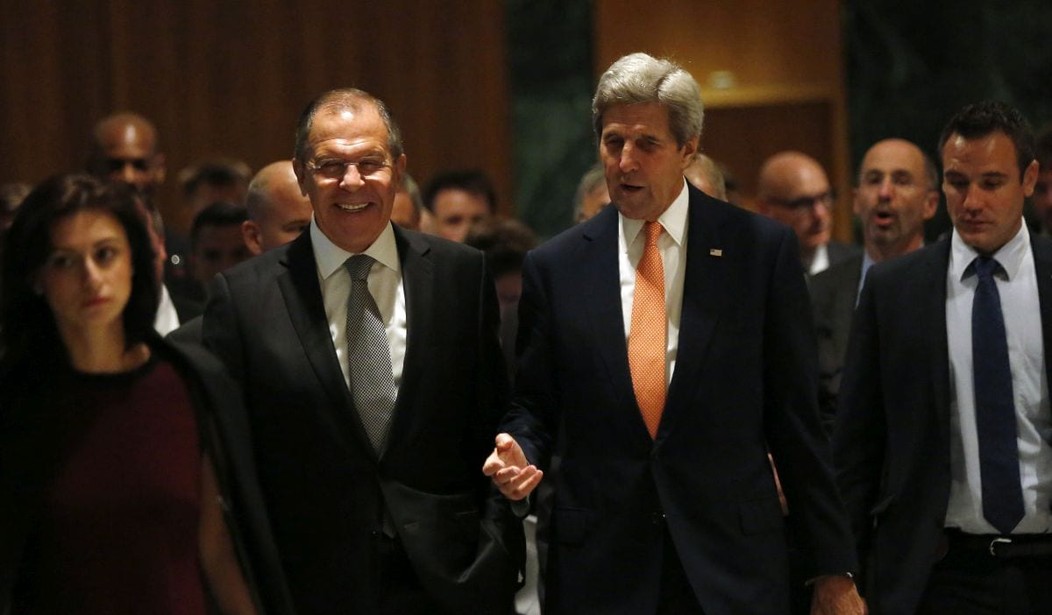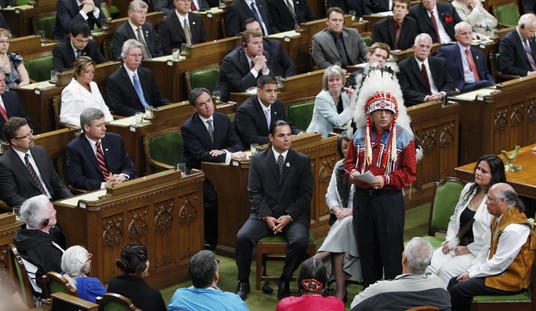U.S. Secretary of State John Kerry and Russian Foreign Minister Sergei Lavrov announced that the two countries had agreed on a ceasefire in Syria that would allow critical humanitarian aid to reach cities and towns most affected by the fighting.
The two nations also agreed on a joint targeting of Islamic extremists who are fighting the regime of President Bashar al-Assad.
This is the second ceasefire agreed to this year. The February agreement fell apart almost immediately and never really took hold.
Russian Foreign Minister Sergei Lavrov said that despite continuing mistrust, the two sides had developed five documents that would revive a failed truce agreed in February and enable military coordination between the U.S. and Russia against militant groups in Syria.
Both sides agreed not to release the documents publicly.
The “most transparent administration in history” strikes again. Read on and the reason for the secrecy becomes obvious: we gave away the store to get Russia onboard.
“The Obama administration, the United States, is going the extra mile here because we believe that Russia, and my colleague (Lavrov), have the ability to press the Assad regime to stop this conflict and to come to the table and make peace,” he said.
Previous efforts to forge agreements to stop the fighting and deliver humanitarian aid to besieged communities in Syria have crumbled within weeks, with the United States accusing Assad’s forces of attacking opposition groups and civilians.
Kerry said the “bedrock” of the new deal was an agreement that the Syrian government would not fly combat missions in an agreed area on the pretext of hunting fighters from the banned Nusra Front, an al-Qaeda affiliate in Syria.
“That should put an end to the barrel bombs, and an end to the indiscriminate bombing, and it has the potential to change the nature of the conflict.”
Under the agreement, Russian-backed government forces and opposition groups, supported by the United States and Gulf States, would halt fighting for a while as a confidence building measure. During this time, opposition fighters will have the chance to separate from militant groups in areas, such as Aleppo, where they have become intermingled.
If the truce holds from Monday, Russia and the United States will begin seven days of preparatory work to set up a “joint implementation center”, where they will share information to delineate territory controlled by Nusra and opposition groups.
Both warring sides would pull back from the strategic Castello Road in Aleppo to create a demilitarized zone, while opposition and government groups would both have to provide safe and unhindered access via Ramouseh in the south of the city.
“We must go after these terrorists,” Kerry said. “Not indiscriminately, but in a strategic, precise and judicious manner so they cannot continue to use the regime’s indiscriminate bombing to rally people to their hateful crimes.”
In truth, there is even less incentive for Assad to stop fighting now than in February. He has the rebels by the short hairs in Aleppo and is approaching a significant victory. As for the rebels, Aleppo is symbolically important to their cause and it is doubtful they will separate from the terrorists, which would weaken their defenses.
Beyond that, Kerry’s words are pathetic and naive. Who does he think has been carrying out “indiscriminate” bombing in Aleppo and elsewhere? Russia has bombed civilian neighborhoods and is suspected of targeting hospitals.
And the Pentagon is livid about “cooperation” with Russia against terrorists. Apparently, the agreement calls for us to give Russia the locations of U.S. backed rebels:
Pentagon and U.S. intelligence officials have spoken out against the idea of closer military cooperation with Russia, in particular the sharing of locations of opposition groups that have fought to topple Assad.
U.S. Defense Secretary Ash Carter, who only days ago delivered a forceful speech in England criticizing Russia, has long been skeptical of Moscow’s intentions in Syria.
The Pentagon said in a statement it would carefully monitor the “preliminary understanding” agreed on Friday and cautioned the Assad regime and its backer, Russia, to stick to deal requirements.
Putin will get a lot of credit for trying another ceasefire but does anyone really see him leaning on Assad to pull back?
The deal goes further than a more limited one reached in February, because it places U.S.-Russian military cooperation in the fight against terrorism at the center of the effort to end Syria’s war and secure a political solution.
It does not however address any of the inherent contradictions that have scuttled past efforts to end the fighting, including the question of why President Bashar al-Assad’s government would want to participate in a process that the United States insists is intended to lead to his departure.
It also does not explain why the group identified as the chief target of the proposed U.S. and Russian military cooperation would comply with a cease-fire intended to bring about its destruction. Kerry and Lavrov named as the main intended target of the airstrikes the former al-Qaeda affiliate Jabhat al-Nusra – which has rebranded itself as the Front for the Conquest of Syria – or Jabhat Fatah al Sham.
There is no way to enforce the ceasefire — no troops to act as a buffer between the two sides. The entire enterprise will rise or fall based on the good faith of President Bashar al-Assad.
The civil war in Syria has its own momentum where even two powerful countries like Russia and the U.S. are unable to bring about a cessation of hostilities — even if both nations were equally intent on doing so. With the rebels losing many of the gains they achieved before Russia intervened, Assad and Putin believe they are winning. A ceasefire only gets in the way of victory.










Join the conversation as a VIP Member